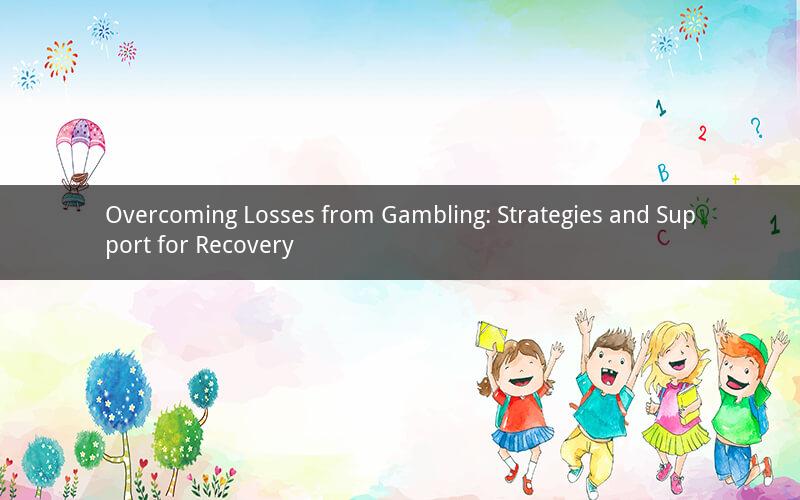
Introduction:
Losing money while gambling can be an emotionally taxing experience. It's a situation that many people find themselves in, often leaving them feeling overwhelmed and uncertain about what to do next. This article delves into various strategies and support options available to individuals who have lost money through gambling. By understanding the available resources and taking proactive steps, individuals can begin their journey towards recovery.
1. Accepting the Loss
Accepting the loss is the first step in overcoming the negative consequences of gambling. Denial can hinder progress and prevent individuals from seeking help. Acknowledging the situation and understanding that gambling is a form of entertainment that involves risk is crucial. It's essential to recognize that losing money is a part of the gambling experience.
2. Seeking Support
Support is vital during the recovery process. Here are some options to consider:
a. Friends and Family: Sharing the experience with trusted individuals can provide emotional support and guidance. They can offer a listening ear, share their own experiences, and help create a supportive environment.
b. Support Groups: Joining a support group, such as Gamblers Anonymous, can provide individuals with a sense of community and understanding. These groups often offer meetings where individuals can share their stories, learn from others, and gain valuable insights.
c. Professional Help: A therapist or counselor specialized in gambling addiction can provide personalized support. They can help individuals develop coping strategies, address underlying issues, and create a plan for recovery.
3. Financial Management
Dealing with the financial consequences of gambling losses is crucial. Here are some steps to consider:
a. Assess the Financial Situation: Understanding the extent of the financial loss is important. This includes analyzing debts, expenses, and income. Knowing the financial situation will help in creating a realistic plan for recovery.
b. Budgeting: Creating a budget can help individuals regain control over their finances. It involves prioritizing essential expenses, identifying unnecessary spending, and allocating funds towards repaying debts.
c. Seeking Financial Assistance: If the financial loss is significant, exploring options for financial assistance can be beneficial. This may include contacting credit counseling services or seeking loans with favorable terms.
4. Setting Boundaries
Establishing boundaries is essential to prevent future gambling-related losses. Here are some strategies:
a. Time Management: Setting a limit on the amount of time spent gambling can help individuals maintain a healthy balance between entertainment and other responsibilities.
b. Financial Limits: Establishing a strict budget for gambling activities can prevent overspending and help control the financial risks involved.
c. Self-Exclusion: Many casinos offer self-exclusion programs that allow individuals to ban themselves from their premises. Utilizing these programs can help prevent the temptation to gamble and reinforce the commitment to recovery.
5. Building a Supportive Environment
Creating a supportive environment is crucial for long-term recovery. Here are some ways to achieve this:
a. Surrounding Oneself with Positive Influences: Surrounding oneself with individuals who support recovery and understand the challenges of overcoming gambling addiction is beneficial. This may involve seeking out supportive friends, family members, or joining recovery groups.
b. Educating Loved Ones: Educating loved ones about gambling addiction can help them better understand the situation and offer appropriate support.
c. Engaging in Healthy Activities: Engaging in positive and healthy activities can distract from the desire to gamble. Activities such as exercise, hobbies, and spending time with loved ones can provide fulfillment and reduce the urge to gamble.
FAQs:
1. Can losing money from gambling lead to addiction?
Yes, losing money from gambling can contribute to the development of a gambling addiction. The emotional and financial consequences of losing can fuel the desire to continue gambling in hopes of recouping the losses.
2. Is it possible to completely overcome a gambling addiction?
Yes, it is possible to completely overcome a gambling addiction with the right support and commitment. Recovery requires time, effort, and a willingness to change.
3. How long does it take to recover from a gambling addiction?
The duration of recovery varies from individual to individual. Some may experience a relatively quick recovery, while others may require ongoing support and therapy for several years.
4. Can financial counseling help in recovering from gambling addiction?
Yes, financial counseling can be highly beneficial in recovering from a gambling addiction. It can help individuals regain control over their finances, develop budgeting skills, and address any underlying financial issues.
5. Are there any alternative forms of therapy for gambling addiction?
Yes, there are alternative forms of therapy available for gambling addiction. These may include cognitive-behavioral therapy, motivational interviewing, and mindfulness-based interventions, among others. The choice of therapy depends on individual preferences and the specific needs of the individual.